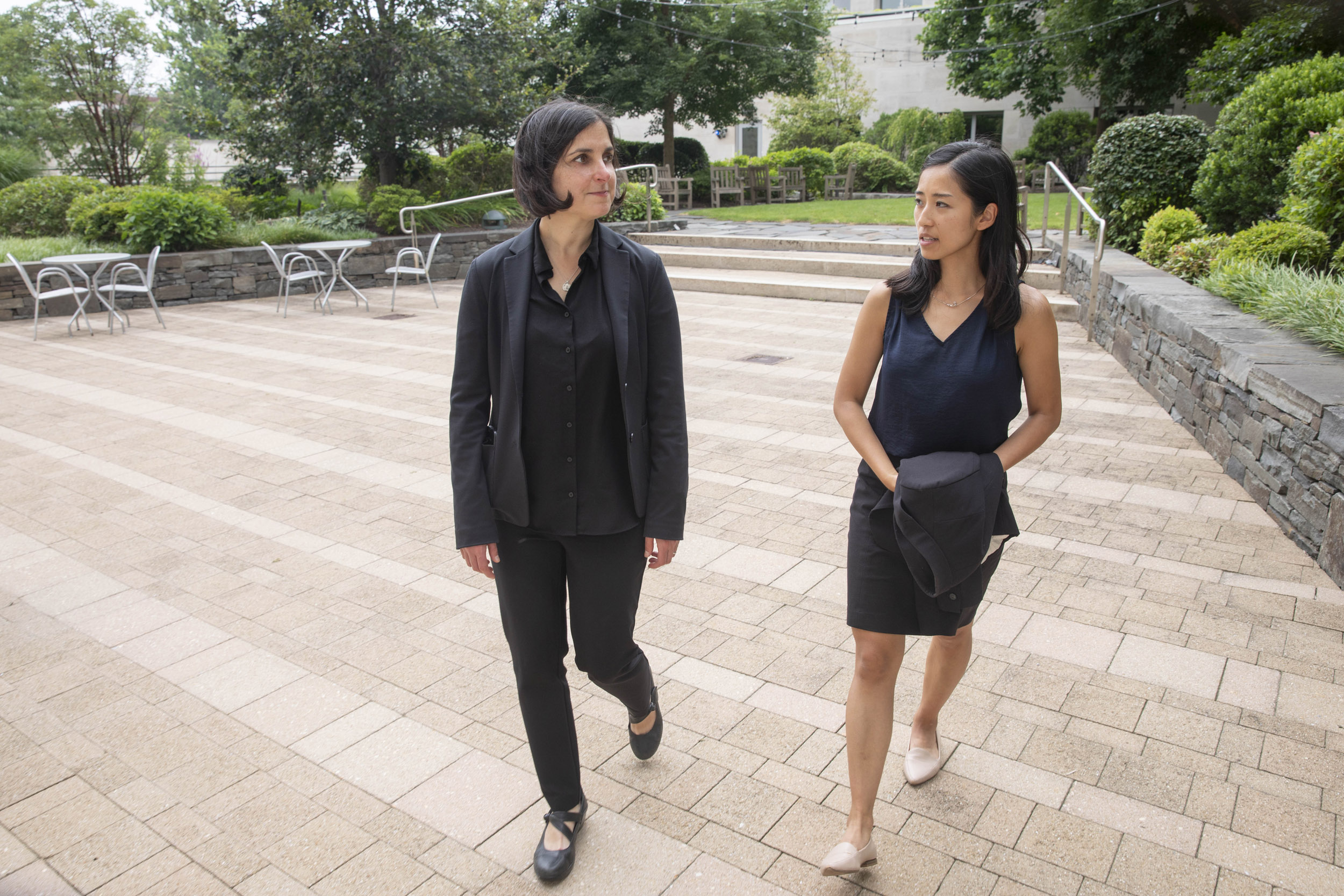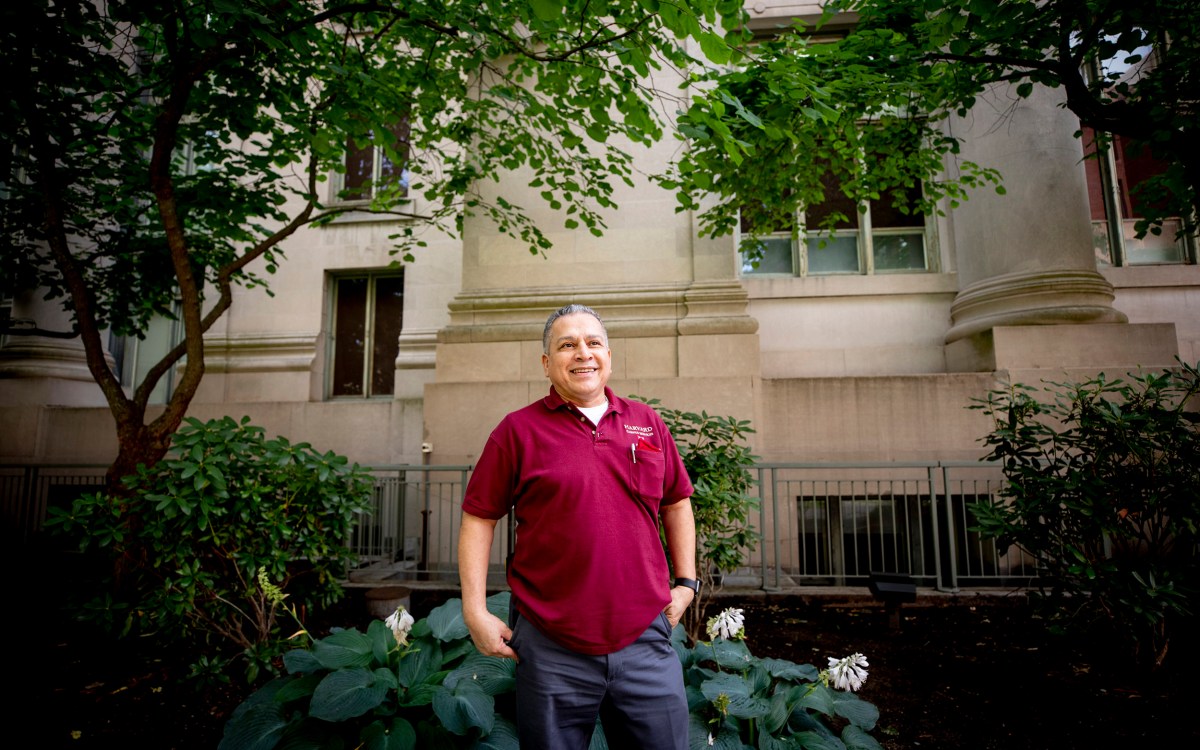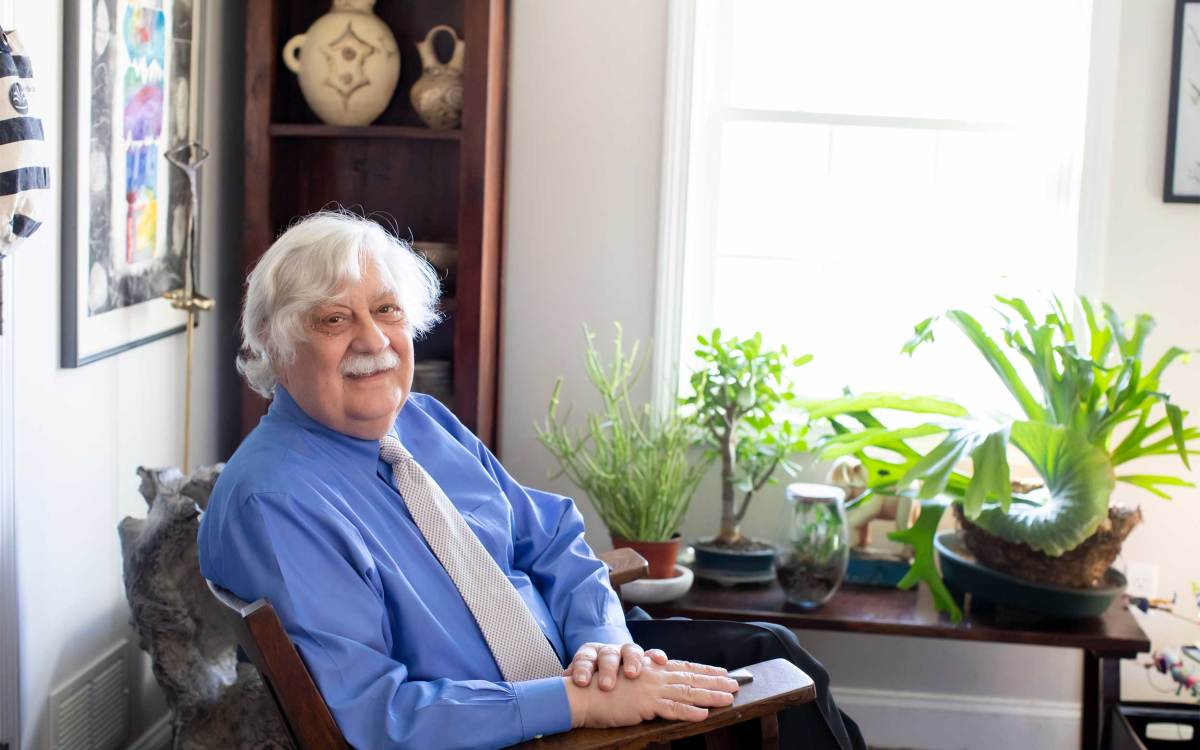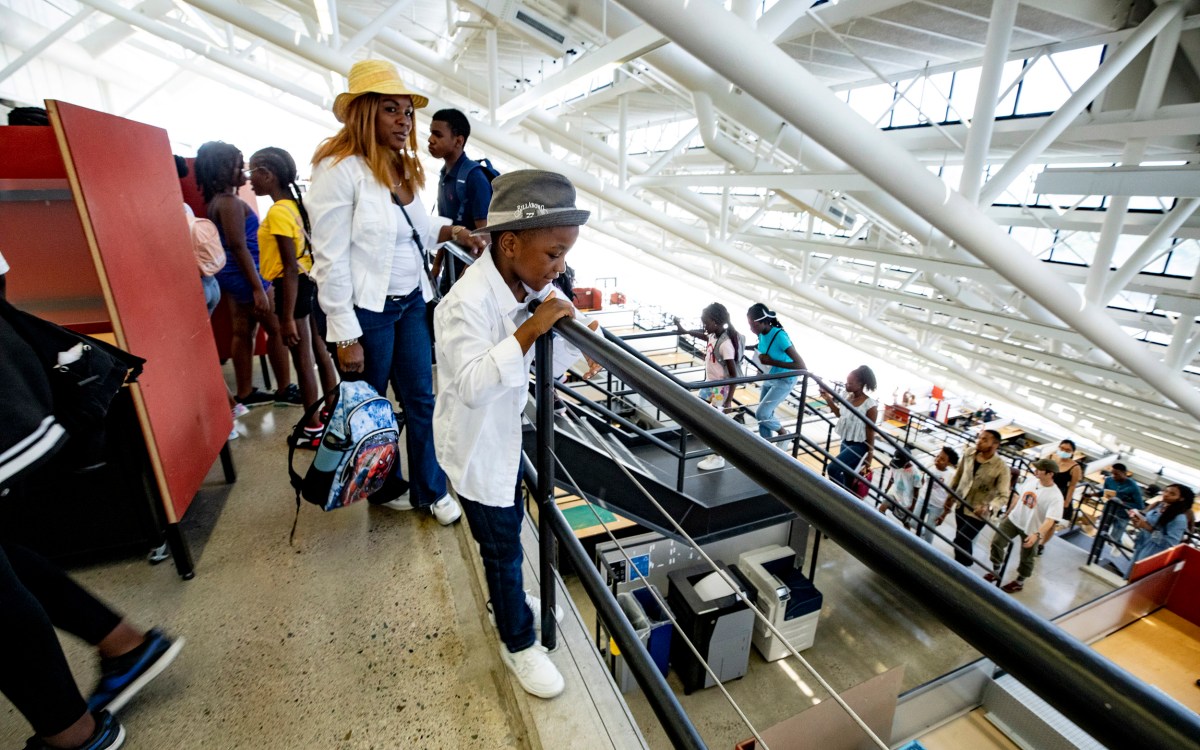
Sabrineh Ardalan (left) and Tiffany Lieu led a study of asylum-seeking families assigned to the Dedicated Docket, focusing on Boston’s program, the largest in the U.S.
Kris Snibbe/Harvard Staff Photographer
New U.S. fast-track immigration program found neither fast nor fair
Law School analysis of Dedicated Docket in Boston says biggest problem lack of legal representation
A new Harvard Law School report found that a Biden administration program intended to speed the processing of asylum cases for prospective immigrants was “neither fair nor expeditious.”
The White House launched the Dedicated Docket program in 2021 in cities across the country to deal with record crossings at the southern border. The report, led by Sabrineh Ardalan, director of the Harvard Immigration Clinic at Harvard Law School, and Tiffany Lieu, clinical instructor, focused on asylum-seeking families assigned to the Boston Dedicated Docket, the largest program in the nation.
The study found that applicants in Boston have less access to counsel and are more likely to be deported. As of August 2022, 24 percent of cases had reached completion and of those, only 4 percent resulted in asylum grants and 34 percent in removal orders. The researchers say a national database found similar disproportionately negative outcomes all over the nation.
The Gazette interviewed Ardalan and Lieu about the problems with the Dedicated Docket, the disproportionately negative outcomes for asylum-seekers in the Boston proceedings, and why they think the program should be terminated.
Q&A
Sabrineh Ardalan and Tiffany Lieu
GAZETTE: Previous administrations have launched fast-track immigration proceedings to deal with asylum-seeking families at the southern border. How does this program compare to others?
LIEU: Before the Biden administration’s program, the Obama and Trump administrations had versions of fast-track proceedings that targeted certain immigrants. All three programs created a specialized docket that fast-tracked the proceedings, and they each had their own problems with fairness and access to justice. We wanted to focus on the Biden administration’s Dedicated Docket to uncover the ways in which these proceedings are denying justice to asylum-seeking families here in Boston.
ARDALAN: The Trump administration made it very clear that immigrants don’t belong here and used the fast-track processes as a mechanism to try to deter people from coming here. Biden tried in theory to make this program be fair and efficient, but the effects have been similar across all administrations.
GAZETTE: How did you undertake your research? Why did you focus on Boston?
ARDALAN: We focused on Boston because our program is here, but also because it’s the largest Dedicated Docket in the country, with over 20,000 individuals of a total of 110,000 placed on Dedicated Dockets all over the country as of August 2022.
We acquired data from the Transactional Records Access Clearinghouse (TRAC) at Syracuse University, which collects and maintains information about staffing, spending, and enforcement activities of the federal government. Tiffany and I were able to become TRAC fellows to analyze the data.
Because of the impact it has on the communities that we serve as an immigration clinic it was important to us to understand what was happening with these new proceedings. Our report builds on a report that had been done on the Los Angeles Dedicated Docket. There is a need for similar reports on dockets across the country.
GAZETTE: The Boston Dedicated Docket is the largest in the country. Why?
LIEU: The Biden administration launched the Boston Dedicated Docket in September 2021 because it believed Boston had the capacity to serve the people who would be placed on this docket. That was misguided insofar as there are legal service provider organizations here in Boston, but most organizations are at capacity, are working around the clock, and still can’t take on all these cases. I think that’s one of the reasons why the Boston Dedicated Docket is large, but the reality is that the current resources are not sufficient by any means, and more resources, on a local and federal level, are necessary.
GAZETTE: Your report said that these fast-tracked immigration proceedings were neither fair nor expeditious. Can you expand on that?
ARDALAN: The lack of fairness relates directly to the lack of adequate representation. It is well established through various studies that having a lawyer in immigration proceedings directly correlates to success in being granted protection against deportation. But most people can’t afford a lawyer, and there is a stark shortage of free legal services. In immigration proceedings, there’s a right to a lawyer, but it’s generally at your own expense.
The other problem we found was that many people didn’t know they were supposed to show up in court because they never received proper notice, and they were ordered removed without ever knowing that they were supposed to be in court.
GAZETTE: The report also found that as of August 2022, of the cases that reached completion, 34 percent resulted in removal orders and only 4 percent were granted asylum. What do these findings show?
LIEU: The disproportionately negative outcomes that we see on the Dedicated Docket in Boston are echoed across all Dedicated Dockets around the country. TRAC, the organization mentioned before, has done research on other Dedicated Dockets, and they too have found disproportionately negative outcomes all over the country.
ARDALAN: We also found that 40 percent of the in absentia removal orders were children, which means that these are kids who were ordered removed without ever having a chance to appear in front of an immigration judge.
LIEU: I would add that 73 percent of those who were ordered removed on the Boston Dedicated Docket were ordered removed in absentia without having their day in court. And in some cases, asylum seekers who were trying to comply with mandatory requirements like going to ICE for their required check-in were ordered removed in court.
GAZETTE: How did you reach the conclusion that the way the Dedicated Dockets were conceived and implemented makes it almost impossible for people to be granted asylum?
LIEU: I think the program, as it has played out, has made it very difficult for people to apply for asylum either because there is insufficient time to effectively prepare a case or because people don’t have access to counsel, and without counsel it’s hard to even apply for asylum in the first instance given the complexity of the immigration system.
GAZETTE: In your view, what should the Biden administration do with the Dedicated Docket program?
LIEU: We join advocates across the country who have called on the Biden administration to end the Dedicated Docket because the way that it has played out has made it nearly impossible for many asylum seekers to be able to seek asylum here, even though by U.S. laws and international laws they do have a right to seek asylum in the U.S. If the Biden administration does not end the Dedicated Docket, our report outlines steps that should be taken, for example, stopping the practice of ordering people removed in absentia without having their day in court, and ensuring, most importantly, that people have access to counsel.
ARDALAN: This program of fast-tracked immigration proceedings for asylum-seeking families should be terminated across the country, not just here in Boston. And to the extent that the docket remains, there should be greater investment in access to counsel at the city and state level as well as the federal level.
People come to the U.S. for many reasons; they don’t make the journey lightly. Many leave everything behind because they have no choice, and they fear for their lives. We should remember that people have a right to seek asylum. The U.S. signed the Protocol to Refugee Convention, and we have a law, the 1980 Refugee Act, that says people have a right to seek asylum regardless of how they come to this country. It doesn’t matter whether they show up with a visa or without one; our laws protect people against returning to places where they would be harmed or killed. Those who are afraid to go back to their home countries should have their cases heard in court. Right now, with this docket, they don’t have that opportunity. The U.S. is violating that right.








